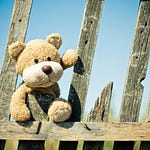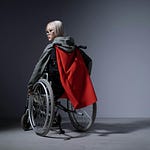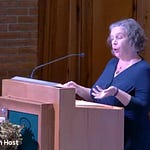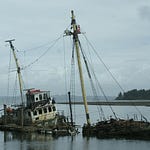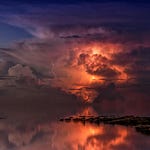We love the myth of being self-made – like we’re seeds that forced their way through rocky soil by sheer will, growing straight and strong without a hint of help. It props up our sense of worth: I did this alone, so I deserve to stand tall.
Beneath that myth lies something tender and raw. If we admitted how much we needed sunlight we didn’t create, water that came from elsewhere, nutrients shared by unseen roots, we might feel we didn’t truly earn our place. That needing help makes us “less than.” That accepting help means we’re not enough on our own.
So we cling to the story.
And sometimes, we’d rather stomp on someone else’s sapling than confront our own fragile soil. We’d rather see no new growth than face the unsettling truth that we were never self-made at all.
But in the forest, trees feed one another. Fungi weave secret pathways that carry sustenance from the strong to the struggling. Life flourishes precisely because it’s shared. No tree is diminished by the nourishment it receives; in fact, it stands taller, roots deeper, widens its canopy, and offers shelter to others in turn.
Maybe the question was never who earned the right to grow. Maybe the question is how much more radiant this whole wild woodland could become if we let go of needing to prove our worth through independence — and instead embraced the exquisite worthiness of being part of something larger, together. Interdependent.
But we don’t see our world like that. Not here. In this society, there is a pervasive fear that if we need help, we are somehow not worthy, that our value rests on how well we can stand apart, not how deeply we’re rooted together.
And that fear shapes so much more than we realize.
Psychologists have found something that might sound almost unbelievable: when given the choice, people will sometimes harm their own well-being — take less for themselves — if it means keeping a group they dislike from getting even a little more.
They’ll stomp down the soil, compact it so nothing grows, not even their own fragile seedlings, just to be sure someone else – someone who is “other” – fails in their planting, too.
That’s not because we’re consciously cruel. Much of this happens below the surface. We are deeply social creatures, often more driven by identity, belonging, and status relative to other groups than by raw self-interest.
So whether our group thrives, we still “win” if those who we oppose – the “other” – lose. You see this in sports all the time. If your team isn’t playing, you may still root for whoever is facing your nemesis.
That’s harmless enough in stadiums, but outside of sports, that mindset becomes devastating.
Our identities get tied up with the roles we play, the work we do, and the causes we fight for. And our worthiness gets tangled up in all of it: If I’m a good spouse, I’m worthy. If I’m a good parent, or teacher, or farmer, I’m worthy. If I stalwartly support my “team,” whether that “team” is a political party, sports franchise, or religious group, then I’m worthy.
And so often we’re called out for not agreeing with everything our “team” does. Except in sports. There, criticizing the players, the coach, even the uniform is half the fun. But everywhere else, demanding absolute loyalty is absurd – and yet somehow expected.
So who do you say you are? How do you define yourself? Is it the roles you play? The work you do? The causes you stand behind? Your faith, your politics, your country?
Or sometimes, is it who you are not? – who you stand against, what lines you draw to prove you belong on this side of the clearing?
If you haven’t thought of race yet, you’re probably white like me, because whiteness in this country often gets to be the default — invisible and unexamined — while others navigate every moment aware of how their skin color shapes their lives.
We build our identities from all these threads. Some of them are beautiful and true. Some of them small and fearful. And sometimes, when our worth feels fragile, we tighten our grip. We think, If they get to grow, maybe there’s less space or light left for me. So we stamp down the earth, we ration the rain, we forget the forest thrives precisely because multitudes of interdependent greenery takes root.
The truth is, when we cling to the idea of being self-made and push back against things like health care, education, strong infrastructure, or climate protections, we’re not proving we can stand on our own. Because whether we admit it or not, we all rise and fall together. And when fear or resentment makes us pull back our care, it doesn’t just keep others out — it shrinks the support we’ll one day need ourselves.
That’s why collective cruelty so often backfires. When we refuse to widen the circle of care, there are fewer hands to build, fewer voices to imagine, fewer hearts to steady what’s fragile, fewer people to care for your family or mine. We might pretend we’re self-sufficient, but we still travel roads built by others, breathe air protected by shared choices, and drink water kept clean by countless unseen hands.
And what a gift it is that we don’t have to stand alone.
So imagine if we saw ourselves the way the forest does. Worthy not because we made it alone, but because we’re part of something vast and intertwined – a living, breathing network of care.
Maybe then we’d stop burning down the forest just to prove we could survive without it or to stop others from growing alongside us. Maybe then we’d all grow taller. Together.
Because love — real, generous love — widens the circle.
It makes more room, not less.
It deepens the soil, nourishes the roots, and lifts the whole forest toward the sun.
Imagine what your life — and this aching, hopeful world — could hold if we stopped proving we stand alone, and simply let ourselves grow side by side, together, in love.
Joni Miller, Ph.D., is a writer, researcher, spiritual coach, and speaker who uses her knowledge, education, and love of all things spiritual to help spiritual wanderers find a place they can call home, navigating by the light of Love. www.SpiritualGeography.net
Photo by Yan Krukau: https://www.pexels.com/photo/back-view-of-a-woman-standing-beside-the-tree-5479965/






